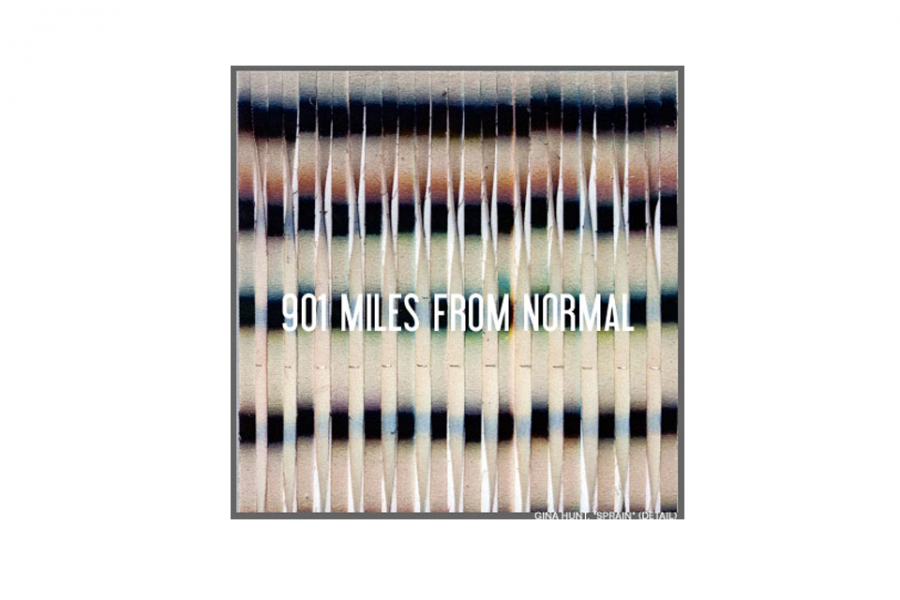M.F.A. students from Illinois State University’s School of Art were featured in a special exhibition at The Front Room, Brooklyn Gallery of Contemporary Art in Williamsburg titled 901 Miles from Normal from February 12–15.
The students were George Barecca, Sam Buchanan, Lexie Bragg, Megan Coonelly, CJ Davis, Emma Farber, Chris Hagen, m. jo hart, Gina Hunt, Venise Keys, Jeremy Lampe, Laura Newman, Krista G Profitt, Stoney Sasser, Dylan Welch, and Micah Zavacky.
901 Miles from Normal features a selection of works by promising M.F.A. students. There are 901 miles between New York City and Normal. Included are distinctive works from the realms of painting, installation, photography, ceramics, glass and prints. This exhibition marks the first time the artists have exhibited in NYC, and it offers them a chance to receive critical response to their artwork.
Barreca draws with slabs of clay that are spontaneously cut and attached to construct functional pots. This direct way of working and his application of loosely brushed, lush colors allows for improvisation and captures a sense of immediacy.
Capturing elaborately staged narratives, Bragg examines the in-between moments of our lives; how our stories happen even when we aren’t ready, and the human need for reason and story telling.
Buchanan’s manipulated paper wall pieces explore the dynamics of neglect and repair, harm and amendment. This exploration manifests in several ways: as woven sheets of previously cut and sagging paper; as stoppers in a broken surface; as padded and stuffed paper.
Relying on childhood images as means for a self-portraiture, Coonelly recalls the awkwardness of childhood and adolescence. Through her manipulation of paint, the desire to form an identity becomes warped and unidentifiable.
Continuing a long-standing interest in labor and its various levels of intersectionality, Davis’s photographs investigate the role of women’s employment in the service and care industries. Through the lens of gender, she is looking to create images that explore the feminized nature of these fields while giving voice to the diversity of real-world worker experiences.
Farber’s approach to contemporary abstraction involves passages culled from autobiographical moments captured in acrylic and oil paint. Her ideas include shifts in visual and mental perception and space as it exists in regard to mood/human emotion.
Hagen’s prints and experimental books act upon a range of communal expectations to explore how we take the world in, how we share it with others, how we try to hold on to fleeting aspects of it, and how we reconsider them in hindsight.
Hart creates female figures out of clay which depict ordinary moments that occur throughout the day. Her objective is to translate the mundane moments of everyday life into quiet, thought-provoking work.
An obsessive fascination with impermanent phenomena is manifest materially in Hunt’s paintings that explore color and light with sprayed paint on cut canvas. Hunt offers simultaneous experiences based in interwoven patterns and color.
Each of Keys’s paintings is more determined than the last to capture the emotion of the black female experience and challenge how abstraction can communicate blackness. Her paintings do not contain power fists, Afros, or black bodies but they are about all of those things.
The relationships that people form, whether new or long standing, are the focus of Profitt’s oil on canvas paintings. Those relationships are played out within the act of painting, which becomes a narrative of her personal connection to the canvas.
Sasser builds playful, surreal and celebratory installations, which mimic biological forms commonly manifested through the material spinoffs of human commerce and production. She uses materials like fabric, foam, yarn, plaster, acrylic and caulk to invite you into her imaginative world of theatrics and intrigue.
Is it possible for a distinct material object to simultaneously have more than one kind of physical identity? With a collection of surrealist meditations on time and space, Oakland artist Welch contemplates this question and in the process creates her own science of whimsy.
Through direct observation and memory, Zavacky creates prints that refer to the landscape. He uses the landscape as a foundation for his perceptual exploration of his subject matter, and his response to an image as it develops.
Lampe’s glass sculptures are dynamic animated works that reference movement and dichotomies between people and their surroundings. He wants to reveal evidence that the works were soft and malleable before the annealing process as a way of showcasing the unique characteristics of glass.
By combining steel and raw, cracked, fired clay, Newman makes abstract sculpture that draw conceptual focus from the ways these materials work together to create forms that are both strong and fragile. This contrast can be related to many things in our modern society, ranging from the construction and eventual decline of cities, to expectations of gender roles.
The Front Room Gallery is located at 147 Roebling Street in Williamsburg Brooklyn. Gallery hours are 1–6 p.m. Friday–Sunday and by appointment.

